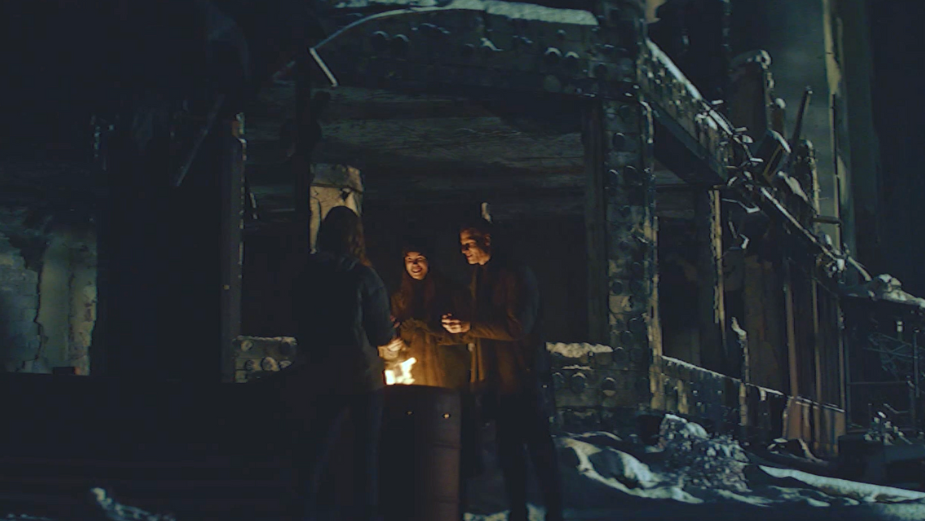
Ben Lacour Shoots Advertisement for Nova Poshta during Ukraine Blackout

Birth’s Benjamin Lacour was invited to direct a film for Nova Poshta to highlight their work during the conflict in Ukraine. Benjamin immediately responded to the request, went to Kyiv, and became the first foreign director to shoot a commercial in the city since the war started.
On his experience and why he accepted the job, Benjamin said "I was extremely hurt and shocked by the war and all the events that have followed since. I thought of all my friends, my crew and my cast over many years of filming in Ukraine; and how, from the beginning, my full support has been for Ukraine and its struggle, our struggle. When my agent Scott (Aylene Gardiner Agency) called me I didn't think twice about it. Family and the members of their teams, Andreiy Latansky too (from Fedoriv Agency) are my friends, my team, and they wanted to make a film with me. I saw no reason not to continue doing what connects us.
This film is being shot for Nova Poshta. A Ukrainian national institution, whose postal services have been critical since the start of Russia's full-scale invasion of Ukraine. This film, conceived by Fedoriv agency, is their first major advertising campaign in a long time.
Benjamin elaborated on why he took the job “Nova Poshta was founded by two men, delivering the mail of their relatives using their own car, in order to make up for the lack of a postal service in their area. Their original car is now parked in front of the imposing terminal in Kiev today. Since the beginning of the war, Nova Poshta has not stopped for a single day. In addition to the specific aid provided, they have maintained this postal link, the first of its kind, and connected Ukrainians against all odds. When I read about it, the script had real meaning and I knew I had to go to Kyiv and do the shoot.”
The campaign was challenging in both a technical and creative sense. In two days, the film crew travelled more than 500 km. 80% of the shoot took place without electricity and mobile coverage after the Russian attacks. The production schedule had to be constantly changed due to daily air alerts that forced the team to hide and wait in shelters. On the third day, a massive attack destroyed electricity and water services in Kyiv and throughout Ukraine.
Benjamin found the shoot to be one of the toughest but also one of the most rewarding of his career “How could I not be impressed by the strength of those who tell me with rage and a smile that they have no water or electricity and are living on the 25th floor, and then tell me about casting horses for one of the scenes that I had in mind. I had experienced lots of crazy things on my shoots around the world, but this was the first time I had shot during an ongoing conflict. The first air alert was surreal. You actually don’t know what is happening. You just panic. You don’t feel stressed, because you can’t measure a danger you haven’t already experienced. But my friends' strength, organisation and positiveness against all odds made me understand it all.
“Blackout was a new challenge. It was not easy to shoot, but we did it thanks to the team's professionalism and the client's trust. Nova Poshta have achieved incredible things at times like these, and we thank them and the Fedoriv agency for allowing us to create this film for them. I hope he will inspire everyone not to give up," commented Family producer Anastasia Bukovska.
In the film, you can see the innovative Kyiv terminal of Nova Poshta, where packages from all over Ukraine are sorted. During the filming of this scene, the team was assisted by Nova Poshta employees because the terminal's work was automated. For the parcel to go to the proper "sleeve" chosen by the director and cameraman for a specific frame, it had to be registered in the system. For this, a sticker with a bar code of the Ukrainian city had to be assigned to the parcel. In this scene, it happened to be Mariupol, a city almost completely destroyed by the Russian military.
The shoot was a success thanks to the hard work of a team, technicians, an agency and a production that does what it loves: making films. “Film-making is in our blood. The film ends with the words Zavtra Bude, which have a double meaning in Ukrainian. ‘It will be delivered tomorrow. Tomorrow will come””.
Slava Ukraina.















